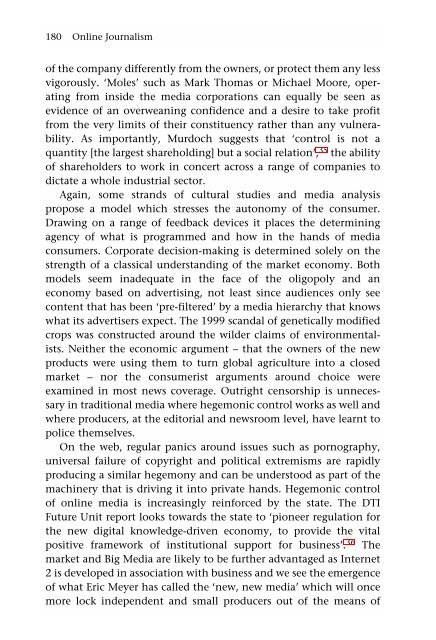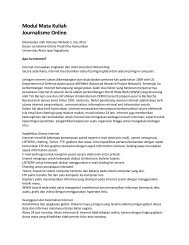Online Journalism - Ayo Menulis FISIP UAJY
Online Journalism - Ayo Menulis FISIP UAJY
Online Journalism - Ayo Menulis FISIP UAJY
You also want an ePaper? Increase the reach of your titles
YUMPU automatically turns print PDFs into web optimized ePapers that Google loves.
180 <strong>Online</strong> <strong>Journalism</strong><br />
of the company differently from the owners, or protect them any less<br />
vigorously. ‘Moles’ such as Mark Thomas or Michael Moore, operating<br />
from inside the media corporations can equally be seen as<br />
evidence of an overweaning confidence and a desire to take profit<br />
from the very limits of their constituency rather than any vulnerability.<br />
As importantly, Murdoch suggests that ‘control is not a<br />
quantity [the largest shareholding] but a social relation’, 35 the ability<br />
of shareholders to work in concert across a range of companies to<br />
dictate a whole industrial sector.<br />
Again, some strands of cultural studies and media analysis<br />
propose a model which stresses the autonomy of the consumer.<br />
Drawing on a range of feedback devices it places the determining<br />
agency of what is programmed and how in the hands of media<br />
consumers. Corporate decision-making is determined solely on the<br />
strength of a classical understanding of the market economy. Both<br />
models seem inadequate in the face of the oligopoly and an<br />
economy based on advertising, not least since audiences only see<br />
content that has been ‘pre-filtered’ by a media hierarchy that knows<br />
what its advertisers expect. The 1999 scandal of genetically modified<br />
crops was constructed around the wilder claims of environmentalists.<br />
Neither the economic argument – that the owners of the new<br />
products were using them to turn global agriculture into a closed<br />
market – nor the consumerist arguments around choice were<br />
examined in most news coverage. Outright censorship is unnecessary<br />
in traditional media where hegemonic control works as well and<br />
where producers, at the editorial and newsroom level, have learnt to<br />
police themselves.<br />
On the web, regular panics around issues such as pornography,<br />
universal failure of copyright and political extremisms are rapidly<br />
producing a similar hegemony and can be understood as part of the<br />
machinery that is driving it into private hands. Hegemonic control<br />
of online media is increasingly reinforced by the state. The DTI<br />
Future Unit report looks towards the state to ‘pioneer regulation for<br />
the new digital knowledge-driven economy, to provide the vital<br />
positive framework of institutional support for business’. 36 The<br />
market and Big Media are likely to be further advantaged as Internet<br />
2 is developed in association with business and we see the emergence<br />
of what Eric Meyer has called the ‘new, new media’ which will once<br />
more lock independent and small producers out of the means of
















